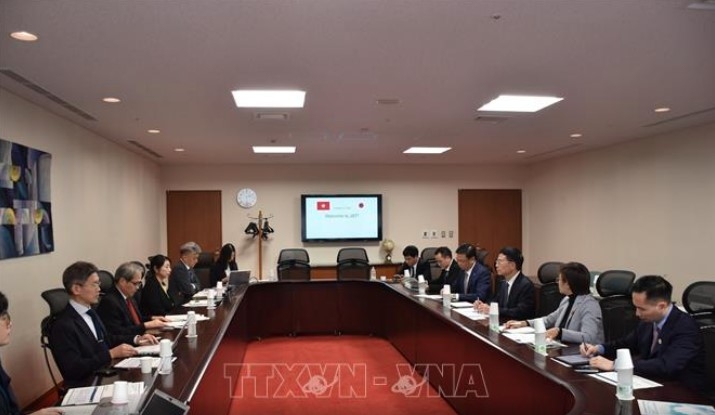New momentum for Vietnam-Japan cooperation in semiconductor and science
VOV.VN - Vietnam and Japan have pledged to bolster cooperation in science and technology, prioritizing semiconductors under JST’s NEXUS program, sending 60 PhD researchers for joint studies and pursuing long-term, co-funded projects as Vietnam ramps up its new AI and infrastructure strategy.

As part of his working trip to Japan, Minister of Science and Technology Nguyen Manh Hung, has recently held a host of meetings with leaders of Japan’s Ministry of Internal Affairs and Communications (MIC) and the Japan Science and Technology Agency (JST).
At the MIC headquarters, State Minister Adachi Masashi welcomed Minister Hung and the delegation, voicing hope that the meeting would further deepen Japan-Vietnam cooperation in science and technology. He recalled Prime Minister Shigeru Ishiba’s statement during his April 2025 visit to Vietnam on strengthening cooperation in this field, stressing that science and technology will remain a key area in bilateral relations.
Minister Hung briefed Adachi on Vietnam’s ongoing administrative reform, under which the Ministry of Science and Technology was formed through the merger of the former Ministry of Science and Technology with the Ministry of Information and Communications. He underscored the special nature of Vietnam-Japan relations as a comprehensive strategic partnership, noting that Japanese companies and people enjoy a strong reputation in Vietnam.
According to him, more than 60 Vietnamese IT firms have already gained access to the Japanese market. The ministry is responsible for science and technology as well as digital technology and digital transformation.
Hung highlighted Vietnam’s newly launched artificial intelligence (AI) strategy, emphasizing that its major focus now is on mobile infrastructure and AI infrastructure. He expressed hope that the Japanese Government and businesses would join Vietnam in this effort.
In response, JST President Kazuhito Hashimoto thanked Minister Hung for supporting the agency’s NEXUS program, one of JST’s flagship initiatives for scientific and technological cooperation with ASEAN member states. He stressed that semiconductors have been chosen as the focal point of Japan-Vietnam collaboration under NEXUS and voiced hope that young Vietnamese researchers could take part in joint semiconductor studies in Japan.
Vietnam has agreed to send 60 PhD candidates to Japan for collaborative research. Hashimoto said he believed one key outcome of this program would be the creation of a pool of 500 high-quality professionals for Vietnam’s semiconductor industry.
Minister Hung underlined that science, technology, and digital transformation are the major drivers of national development, making them one of the pillars of Vietnam’s comprehensive cooperation with Japan.
Regarding the NEXUS program, he said Vietnam is prioritizing semiconductors as a strategic field, with a focus on chip design and materials, while seeking to expand into advanced packaging. Both sides will push to co-fund long-term projects of five to ten years, with increased investment for research.
The minister also proposed broadening cooperation to other strategic sectors, including joint funding for commercialization of research results in both countries. He affirmed Vietnam’s strong commitment in this regard.
For his part, Hashimoto fully agreed with the minister’s proposals. In his capacity as science and technology adviser to Prime Minister Shigeru Ishiba, he pledged to review the ideas and put forward recommendations to the Japanese government.
Minister Hung reiterated that Vietnam aims to become an upper-middle-income country based on science and technology and expressed confidence that Japan will play an even more important role in this development journey.



